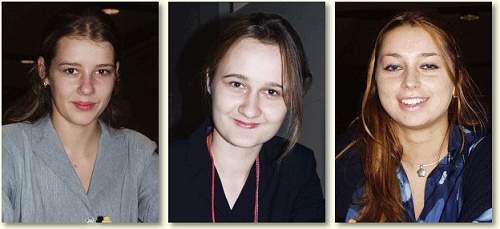


ChessBase 17 - Mega package - Edition 2024
It is the program of choice for anyone who loves the game and wants to know more about it. Start your personal success story with ChessBase and enjoy the game even more.
Please note that the videos listed below are not included as links on this page.
They are only available on the ChessBase Magazine CD.
He hails from Moscow but spent a lot of his life in the Republic of Kazakhstan. Vladislav Tkachiev (pronounced approximately kah-choff) is now 29 and lives in Cannes, France. His Elo rating is 2634, which makes him a member of the elite group of Super-Grandmasters. He is known as a flamboyant personality, popular amongst his colleagues, with a large following of female admirers.
During a chess tournament in Biel, Switzerland, in which he was playing, I had an opportunity to switch on my video camera during one of our animated discussions. These occur periodically in different parts of the world, and I always enjoy them immensely. This young man does not hold back with his lucid and original views. His English is excellent and he is able to express his thoughts at a very sophisticated level. And he is blessed with a keen sense of humour, spiced with self-deprecating sound bites that make interviews like the following all the more endearing.

Video Tkach1x (7 min 48 sec)
Vlad Tkachiev tells us about his childhood and his life in Kazakhstan. He talks about his languages, his love for music, literature, and films. It is fascinating to hear how chess is always with him, whatever he is doing, and how everything translates into chess language in his mind. Here's an extract:
I was born in Moscow, then our family went to Kazakhstan, and it was there in 1983 that I started to play chess. I lived there until 1996, then I moved to Cannes, and now I am sharing my time between Cannes and Moscow. English is my second language, and three years ago I started learning French. This was not easy, but then I developed my own method, using music. I learnt a lot of songs by heart, every word, and once you have them all in your mind it is very easy to construct sentences.
Even when I am not playing it doesn't mean that chess leaves my mind. I am speaking with you, but at the same time the position against Kortschnoi is going through my mind. It is difficult to explain: I am talking with you, and everything we say is beginning to translate into chess language. You looked at me, Nf3, the girl over there smiled, Nf6, somebody fell over there, c4. This has not been described, because unfortunately the books about the subject have not been written by real chess players. Let me explain it again: Today I talked with you, I went to the swimming pool, I played a game, I went to the bar, I had dinner. And all this is beginning to be translated into chess moves. Nf3, Nf6, c4, g6. It is on the brink of madness, but I have asked many players and they have the same experience. I translate everyday life into chess moves, and it happens even if I don't want it to. Sometimes I ask myself "are you nuts?" The answer is definitely yes. Well, slightly, but it is true.

Video Tkach2x (4 min 53 sec)
What does he think about the condition of the chess world? Vlad talks about the consequences of the Prague unity agreement. He also understands the problems facing sponsors, and how classical chess is almost impossible as a spectator sport, and he give us a vivid demonstration on how (rapid) chess should be presented. Once again some excerpts:
There are definitely some reasons to be unhappy with the Prague Unity Agreement. The knock-out world championship which helped us to live good lives for some years will only be the qualification for the real championship. On the other hand perhaps our world will become more stable, and sponsors will be more interested in investing money.
I think there need to be three ratings, for blitz, rapid and classical chess. Why should someone like Arbakov, who is a blitz genius, or Svidler, why are their talents less estimated than someone who plays well in classical chess? I was told by Seirawan that the blitz world championship in St John in 1988 had a fantastic media impact. The sponsors were ready to do it again for ten years. We have to be objective: if you want to get the new generation, teenagers, the biggest consumer group, it is impossible to interest them in today's classical chess, simply impossible. With blitz that is not the case. My mother, who does not play chess at all, came to a blitz tournament and said it was like a horse race. The question was who would fall first. Anyone who is interested in seeing horses race each other can be interested in blitz.

Of course it has to be well presented, by a very good presenter, with commentary like in soccer: Kasparov is attacking on the queenside, etc (very excited). And then after the game, serious commentary: it was a Sicilian defence, White played the main line of the Rauser Variation, bla-bla-bla, but only during the break. When the next game starts once again tension, tension, tension. That's the way to do it.

Video Tkach3x (2 min 43 sec)
Vladislav Tkachiev talks about chess on the Internet, and how he prefers human contact during the game. This leads to the highlight of this entire multimedia report: his description of what it is like to face Garry Kasparov across the board. If you miss this part you have only yourself to blame.
The Internet opens new horizons for chess, but I prefer human contact. For instant it is very interesting to play against Kasparov. I played against him in Cannes last year, and it was very instructive, the way he prepares himself before the game, how he motivates himself. Then he approaches.

I think he's about my height, but he looks a meter taller. And then I looked as his eyes, and they were like a glass of Guinness [using his coffee glass to illustrate], with energy swirling around. My god, then I said to myself, Vlad, stop looking at him, just look at the board. I did not look at him again in the game, it was too frightening.

Video Tkach4x (2 min 27 sec)
How about computers playing chess? "I think it's not a bad idea, but it should be better paid." Tkachiev sees the danger of computers becoming so strong that human players will lose their jobs. It is because chess has this incredible image of an intellectual activity and people lose interest when they learn that computers are better at it than humans.
The danger is too big for us, we can simply lose our jobs. I am personally afraid. Okay, everybody knows that a tennis machine can fire balls faster than Agassi, and still people are interested in human tennis. But: chess is something different, we have a nice image of being such intellectual people, which is not true at all I think, and it was a very big shock, even for amateurs who don't play chess, when Kasparov lost against the computer. I spoke to a music star from Kazakhstan, and when he discovered that I was a chessplayer he asked me whether I could beat his computer. He pull out a palm pilot. Of course I beat it easily. And he was shocked. He said: "but Kasparov lost!" You see, it's a danger for us.

Video Tkach5x (4 min 07 sec)
"I think the intellectual image of chess players is highly overrated," he says. "I, for instance, am a very good example for that." But he does go on to explain how he became such a strong chess player. At the end he talks about the anxiety of a young man who is pushing 30, and some problems he has in his romantic life.
It is shocking when you are almost 30 and you realise that you don't know at all what this life is about. Once someone asked me "what is your job" and I said "chessplayer" and he said "Chessplayer? What do you create? And someone is paying you for that?" He couldn't understand it. Every day I live with the feeling that very soon I will be 30. It is time to think about the eternal things.

I would like to get married, but the problem is that I simply can't, well, fall in love. That is the big problem. I am always in the mood, but I can't fall in love really deeply. For instance if I have a girlfriend, which happens quite often, it doesn't bother me to look around, and at some time I get bored. Actually it a very traumatic subject and we should stop talking about it.

Video Tkach6x (1 min 55 sec)
Talking about romance, how about a beauty contest for chess players? Naturally only "for the girls", says Vlad, who has no aspirations to participate himself. The interview ends on a humorously sexist note.
Among the girls who could compete for the beauty contest title are Kosteniuk, of course, and then the big favourites are Reizniece, a Latvian player who is a very spectacular woman, and Shirov's wife Viktorija Cmilyte might participate as well. Another big favourite is Regina Pokorna, who is a child-woman, an eternal girl.

Three candidates in Tkachiev's "beauty contest": Dana Reizniece of Latvia, Viktorija Cmilyte of Lithuania and Regina Pokorna of Slovakia. All three pictures were taken from the ChessBase Players Database and are from the year 2000.
The reason there are so many beautiful women playing chess these days is because the game has become faster and faster. As Tal said it was always too difficult for women to play chess because during the games they are forced to keep silent. Now the games are much quicker and it has become easier to shut up during the games [laughs uproariously].